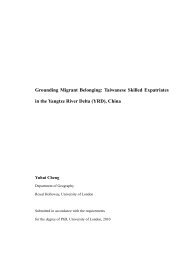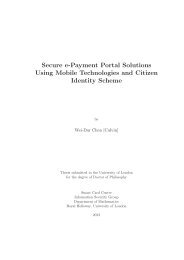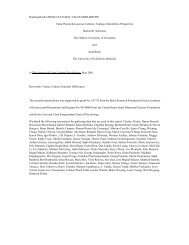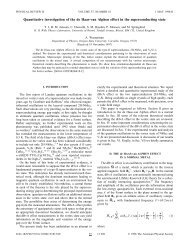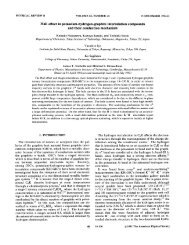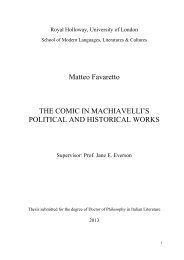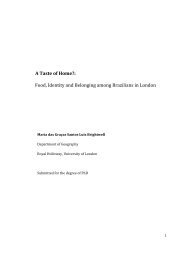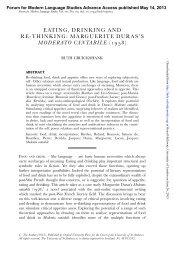- Page 1 and 2:
A User Centric Security Model for T
- Page 3 and 4:
Declaration These doctoral studies
- Page 5 and 6:
R. N. Akram, K. Markantonakis, and
- Page 7 and 8:
Abstract In this thesis we propose
- Page 9 and 10:
CONTENTS 3.4.1 Supplier . . . . . .
- Page 11 and 12:
CONTENTS 7 Application Sharing Mech
- Page 13 and 14:
CONTENTS C.4 Secure and Trusted Cha
- Page 15 and 16:
LIST OF FIGURES 8.6 Control ow diag
- Page 17 and 18:
List of Abbreviations AAC Applicati
- Page 19 and 20:
1.1 Setting the Scene 1.1 Setting t
- Page 21 and 22:
1.2 A Brief History of Smart Cards
- Page 23 and 24:
1.3 Motivation and Challenges Over
- Page 25 and 26:
1.3 Motivation and Challenges compu
- Page 27 and 28:
1.4 Contributions the UCTD manufact
- Page 29 and 30:
1.5 Structure of the Thesis traditi
- Page 31 and 32:
Chapter 2 User Centric Tamper-Resis
- Page 33 and 34:
2.2 Rationale for a User Centric Ta
- Page 35 and 36:
2.2 Rationale for a User Centric Ta
- Page 37 and 38:
2.3 Candidates for User Centric Tam
- Page 39 and 40:
2.3 Candidates for User Centric Tam
- Page 41 and 42:
2.3 Candidates for User Centric Tam
- Page 43 and 44:
Businesses Governments Privacy Pres
- Page 45 and 46:
2.4 The User Centric Tamper-Resista
- Page 47 and 48:
2.5 Case Studies an enrolment proce
- Page 49 and 50:
2.5 Case Studies issued the applica
- Page 51 and 52:
Chapter 3 Smart Card Ownership Mode
- Page 53 and 54:
3.2 Issuer Centric Smart Card Owner
- Page 55 and 56:
3.2 Issuer Centric Smart Card Owner
- Page 57 and 58:
3.3 Frameworks for the ICOM which i
- Page 59 and 60:
3.3 Frameworks for the ICOM Applica
- Page 61 and 62:
3.3 Frameworks for the ICOM which i
- Page 63 and 64:
3.3 Frameworks for the ICOM Element
- Page 65 and 66:
3.4 User Centric Smart Card Ownersh
- Page 67 and 68:
3.4 User Centric Smart Card Ownersh
- Page 69 and 70:
3.4 User Centric Smart Card Ownersh
- Page 71 and 72:
3.5 Security and Operational Requir
- Page 73 and 74:
3.5 Security and Operational Requir
- Page 75 and 76:
3.5 Security and Operational Requir
- Page 77 and 78:
Service Provider 3.6 Coopetitive Ar
- Page 79 and 80:
Chapter 4 User Centric Smart Card A
- Page 81 and 82:
4.2 Platform Architecture Platform
- Page 83 and 84:
4.2 Platform Architecture manager c
- Page 85 and 86:
4.3 Trusted Environment & Execution
- Page 87 and 88:
4.3 Trusted Environment & Execution
- Page 89 and 90:
4.3 Trusted Environment & Execution
- Page 91 and 92:
4.4 Security Assurance and Validati
- Page 93 and 94:
4.5 Attestation Mechanisms 4.5 Atte
- Page 95 and 96:
4.5 Attestation Mechanisms rational
- Page 97 and 98:
4.5 Attestation Mechanisms otherwis
- Page 99 and 100:
4.6 Device Ownership 4.6.2 User Own
- Page 101 and 102:
4.7 Attestation Protocol can succes
- Page 103 and 104:
4.7 Attestation Protocol an adversa
- Page 105 and 106:
4.7 Attestation Protocol SC i ′ a
- Page 107 and 108:
4.8 Protocol Analysis CasperFDR app
- Page 109 and 110:
4.9 Summary whereas the online atte
- Page 111 and 112: 5.1 Introduction 5.1 Introduction E
- Page 113 and 114: 5.2 GlobalPlatform Card Management
- Page 115 and 116: 5.3 Multos Card Management Framewor
- Page 117 and 118: 5.4 Proposed Smart Card Management
- Page 119 and 120: 5.4 Proposed Smart Card Management
- Page 121 and 122: 5.5 Card Management-Related Issues
- Page 123 and 124: 5.5 Card Management-Related Issues
- Page 125 and 126: 5.5 Card Management-Related Issues
- Page 127 and 128: Chapter 6 Secure and Trusted Channe
- Page 129 and 130: 6.2 Secure Channel Protocols 6.2 Se
- Page 131 and 132: 6.2 Secure Channel Protocols smart
- Page 133 and 134: 6.2 Secure Channel Protocols SOG-16
- Page 135 and 136: 6.2 Secure Channel Protocols Notati
- Page 137 and 138: 6.3 Secure and Trusted Channel Prot
- Page 139 and 140: 6.4 Secure and Trusted Channel Prot
- Page 141 and 142: 6.5 Application Acquisition and Con
- Page 143 and 144: 6.5 Application Acquisition and Con
- Page 145 and 146: 6.5 Application Acquisition and Con
- Page 147 and 148: 6.6 Analysis of the Proposed Protoc
- Page 149 and 150: 6.6 Analysis of the Proposed Protoc
- Page 151 and 152: 6.6 Analysis of the Proposed Protoc
- Page 153 and 154: 6.6 Analysis of the Proposed Protoc
- Page 155 and 156: 6.7 Summary For the STCP ACA , we n
- Page 157 and 158: Chapter 7 Application Sharing Mecha
- Page 159 and 160: 7.2 Application Sharing Mechanism 7
- Page 161: 7.2 Application Sharing Mechanism I
- Page 165 and 166: 7.3 UCTD Firewall utilises CDAM to
- Page 167 and 168: 7.3 UCTD Firewall application. Ther
- Page 169 and 170: 7.3 UCTD Firewall 7.3.6 Cross-Devic
- Page 171 and 172: 7.3 UCTD Firewall and asynchronous
- Page 173 and 174: 7.3 UCTD Firewall Table 7.2: Protoc
- Page 175 and 176: 7.4 Application Binding Protocol L
- Page 177 and 178: 7.5 Platform Binding Protocol The r
- Page 179 and 180: 7.6 Application Binding Protocol D
- Page 181 and 182: 7.7 Analysis of the Proposed Protoc
- Page 183 and 184: 7.7 Analysis of the Proposed Protoc
- Page 185 and 186: 7.7 Analysis of the Proposed Protoc
- Page 187 and 188: Chapter 8 Smart Card Runtime Enviro
- Page 189 and 190: 8.2 Smart Card Runtime Environment
- Page 191 and 192: 8.2 Smart Card Runtime Environment
- Page 193 and 194: 8.2 Smart Card Runtime Environment
- Page 195 and 196: 8.3 Runtime Protection Mechanism In
- Page 197 and 198: 8.3 Runtime Protection Mechanism it
- Page 199 and 200: 8.3 Runtime Protection Mechanism er
- Page 201 and 202: 8.3 Runtime Protection Mechanism id
- Page 203 and 204: 8.3 Runtime Protection Mechanism Th
- Page 205 and 206: 8.4 Analysis of the Runtime Protect
- Page 207 and 208: 8.4 Analysis of the Runtime Protect
- Page 209 and 210: 8.5 Summary representation; the abs
- Page 211 and 212: Chapter 9 Backup, Migration, and De
- Page 213 and 214:
9.2 Backup and Migration Framework
- Page 215 and 216:
9.2 Backup and Migration Framework
- Page 217 and 218:
9.3 Application Deletion tion of th
- Page 219 and 220:
9.3 Application Deletion The deleti
- Page 221 and 222:
9.3 Application Deletion authorises
- Page 223 and 224:
9.5 Summary 9.5 Summary In this cha
- Page 225 and 226:
10.1 Summary and Conclusions 10.1 S
- Page 227 and 228:
10.1 Summary and Conclusions giving
- Page 229 and 230:
10.2 Recommendations for Future Wor
- Page 231 and 232:
Appendix A Description of Protocols
- Page 233 and 234:
A.3 Aziz-Die (AD) Protocol on the p
- Page 235 and 236:
A.5 Just-Fast-Keying (JFK) Protocol
- Page 237 and 238:
A.8 Markantonakis-Mayes (MM) Protoc
- Page 239 and 240:
A.9 Sirett-Mayes-Markantonakis (SM)
- Page 241 and 242:
B.1 Brief Introduction to the Caspe
- Page 243 and 244:
B.3 Secure and Trusted Channel Prot
- Page 245 and 246:
B.4 Secure and Trusted Channel Prot
- Page 247 and 248:
B.6 Application Binding Protocol L
- Page 249 and 250:
B.7 Platform Binding Protocol B.7 P
- Page 251 and 252:
B.8 Application Binding Protocol D
- Page 253 and 254:
C.1 Oine Attestation Mechanism C.1
- Page 255 and 256:
C.1 Oine Attestation Mechanism 93 (
- Page 257 and 258:
C.1 Oine Attestation Mechanism 194
- Page 259 and 260:
C.1 Oine Attestation Mechanism 47 (
- Page 261 and 262:
C.1 Oine Attestation Mechanism 148
- Page 263 and 264:
C.2 Online Attestation Mechanism C.
- Page 265 and 266:
C.2 Online Attestation Mechanism 10
- Page 267 and 268:
C.2 Online Attestation Mechanism 20
- Page 269 and 270:
C.2 Online Attestation Mechanism 67
- Page 271 and 272:
C.2 Online Attestation Mechanism 16
- Page 273 and 274:
C.3 Attestation Protocol 15 import
- Page 275 and 276:
C.3 Attestation Protocol 112 f a l
- Page 277 and 278:
C.3 Attestation Protocol 214 } 215
- Page 279 and 280:
C.3 Attestation Protocol 312 inLeng
- Page 281 and 282:
C.3 Attestation Protocol 410 this .
- Page 283 and 284:
C.3 Attestation Protocol 7 import j
- Page 285 and 286:
C.3 Attestation Protocol 107 this .
- Page 287 and 288:
C.3 Attestation Protocol 204 ( this
- Page 289 and 290:
C.3 Attestation Protocol 302 } 303
- Page 291 and 292:
C.4 Secure and Trusted Channel Prot
- Page 293 and 294:
C.4 Secure and Trusted Channel Prot
- Page 295 and 296:
C.4 Secure and Trusted Channel Prot
- Page 297 and 298:
C.4 Secure and Trusted Channel Prot
- Page 299 and 300:
C.4 Secure and Trusted Channel Prot
- Page 301 and 302:
C.4 Secure and Trusted Channel Prot
- Page 303 and 304:
C.4 Secure and Trusted Channel Prot
- Page 305 and 306:
C.4 Secure and Trusted Channel Prot
- Page 307 and 308:
C.4 Secure and Trusted Channel Prot
- Page 309 and 310:
C.4 Secure and Trusted Channel Prot
- Page 311 and 312:
C.4 Secure and Trusted Channel Prot
- Page 313 and 314:
C.5 Secure and Trusted Channel Prot
- Page 315 and 316:
C.5 Secure and Trusted Channel Prot
- Page 317 and 318:
C.5 Secure and Trusted Channel Prot
- Page 319 and 320:
C.5 Secure and Trusted Channel Prot
- Page 321 and 322:
C.5 Secure and Trusted Channel Prot
- Page 323 and 324:
C.5 Secure and Trusted Channel Prot
- Page 325 and 326:
C.5 Secure and Trusted Channel Prot
- Page 327 and 328:
C.5 Secure and Trusted Channel Prot
- Page 329 and 330:
C.5 Secure and Trusted Channel Prot
- Page 331 and 332:
C.5 Secure and Trusted Channel Prot
- Page 333 and 334:
C.6 Application Acquisition and Con
- Page 335 and 336:
C.6 Application Acquisition and Con
- Page 337 and 338:
C.6 Application Acquisition and Con
- Page 339 and 340:
C.6 Application Acquisition and Con
- Page 341 and 342:
C.6 Application Acquisition and Con
- Page 343 and 344:
C.6 Application Acquisition and Con
- Page 345 and 346:
C.6 Application Acquisition and Con
- Page 347 and 348:
C.6 Application Acquisition and Con
- Page 349 and 350:
C.6 Application Acquisition and Con
- Page 351 and 352:
C.6 Application Acquisition and Con
- Page 353 and 354:
C.6 Application Acquisition and Con
- Page 355 and 356:
C.6 Application Acquisition and Con
- Page 357 and 358:
C.6 Application Acquisition and Con
- Page 359 and 360:
C.6 Application Acquisition and Con
- Page 361 and 362:
C.6 Application Acquisition and Con
- Page 363 and 364:
C.6 Application Acquisition and Con
- Page 365 and 366:
C.7 Application Binding Protocol -
- Page 367 and 368:
C.7 Application Binding Protocol -
- Page 369 and 370:
C.7 Application Binding Protocol -
- Page 371 and 372:
C.7 Application Binding Protocol -
- Page 373 and 374:
C.7 Application Binding Protocol -
- Page 375 and 376:
C.7 Application Binding Protocol -
- Page 377 and 378:
C.8 Application Binding Protocol -
- Page 379 and 380:
C.8 Application Binding Protocol -
- Page 381 and 382:
C.8 Application Binding Protocol -
- Page 383 and 384:
C.8 Application Binding Protocol -
- Page 385 and 386:
C.8 Application Binding Protocol -
- Page 387 and 388:
C.8 Application Binding Protocol -
- Page 389 and 390:
C.8 Application Binding Protocol -
- Page 391 and 392:
C.8 Application Binding Protocol -
- Page 393 and 394:
C.8 Application Binding Protocol -
- Page 395 and 396:
C.8 Application Binding Protocol -
- Page 397 and 398:
C.8 Application Binding Protocol -
- Page 399 and 400:
C.8 Application Binding Protocol -
- Page 401 and 402:
C.8 Application Binding Protocol -
- Page 403 and 404:
C.8 Application Binding Protocol -
- Page 405 and 406:
C.9 Platform Binding Protocol 17 im
- Page 407 and 408:
C.9 Platform Binding Protocol 119 p
- Page 409 and 410:
C.9 Platform Binding Protocol 221 i
- Page 411 and 412:
C.9 Platform Binding Protocol 323 c
- Page 413 and 414:
C.9 Platform Binding Protocol 424 +
- Page 415 and 416:
C.9 Platform Binding Protocol 524 S
- Page 417 and 418:
C.9 Platform Binding Protocol 626 i
- Page 419 and 420:
C.9 Platform Binding Protocol 47 (
- Page 421 and 422:
C.9 Platform Binding Protocol 149 J
- Page 423 and 424:
C.9 Platform Binding Protocol 248 i
- Page 425 and 426:
C.9 Platform Binding Protocol 350 +
- Page 427 and 428:
C.9 Platform Binding Protocol 451 p
- Page 429 and 430:
C.9 Platform Binding Protocol 552 r
- Page 431 and 432:
C.10 Abstract Virtual Machine 42 "
- Page 433 and 434:
C.11 Implementation Helper Classes
- Page 435 and 436:
C.11 Implementation Helper Classes
- Page 437 and 438:
C.11 Implementation Helper Classes
- Page 439 and 440:
C.11 Implementation Helper Classes
- Page 441 and 442:
C.11 Implementation Helper Classes
- Page 443 and 444:
C.11 Implementation Helper Classes
- Page 445 and 446:
C.11 Implementation Helper Classes
- Page 447 and 448:
C.11 Implementation Helper Classes
- Page 449 and 450:
C.11 Implementation Helper Classes
- Page 451 and 452:
BIBLIOGRAPHY August 2009, pp. 2035.
- Page 453 and 454:
BIBLIOGRAPHY Available: http://www.
- Page 455 and 456:
BIBLIOGRAPHY Institute of Technolog
- Page 457 and 458:
BIBLIOGRAPHY ing, vol. 2, pp. 42342
- Page 459 and 460:
BIBLIOGRAPHY Available: http://csrc
- Page 461 and 462:
BIBLIOGRAPHY Group_TRUST/PubsPDF/CA
- Page 463 and 464:
BIBLIOGRAPHY [161] D. A. Basin, S.
- Page 465 and 466:
BIBLIOGRAPHY pp. 1414. [186] R. N.
- Page 467 and 468:
BIBLIOGRAPHY [208] T. S. Messerges,
- Page 469:
BIBLIOGRAPHY Science, P. Samarati,



